The realm of online shopping has witnessed a significant shift towards open-source shopping platforms, fostering innovation and collaboration within the community. In this article, we delve into the top 20 open-source shopping websites that have gained prominence for their flexibility, customization options, and community-driven development.
1. WooCommerce

As a WordPress plugin, WooCommerce is a powerful and versatile open-source shopping solution. It seamlessly integrates with WordPress websites, offering a user-friendly experience for both merchants and customers.
Features
- Tailor product displays to suit individual brand aesthetics.
- Support for a variety of trusted and secure payment options.
- Efficient tools for tracking and managing product inventory.
- Extensive range of plugins for enhanced functionality.
Advantages
- Provides a familiar environment for users already accustomed to WordPress.
- Ongoing updates, security patches, and a wealth of plugins.
- Intuitive interface for both merchants and customers.
2. Magento

Magento is an open-source e-commerce platform renowned for its scalability and flexibility, making it suitable for businesses of all sizes.
Features
- Manage multiple stores from a centralized platform.
- Ensures optimal viewing on various devices.
- Advanced tools for efficient organization and display of products.
- Allows extensive customization and extension of online stores.
Advantages
- Suitable for businesses of all sizes and adaptable to varying needs.
- Frequent updates and a wide array of extensions.
- High-performance capabilities for a seamless shopping experience.
3. OpenCart
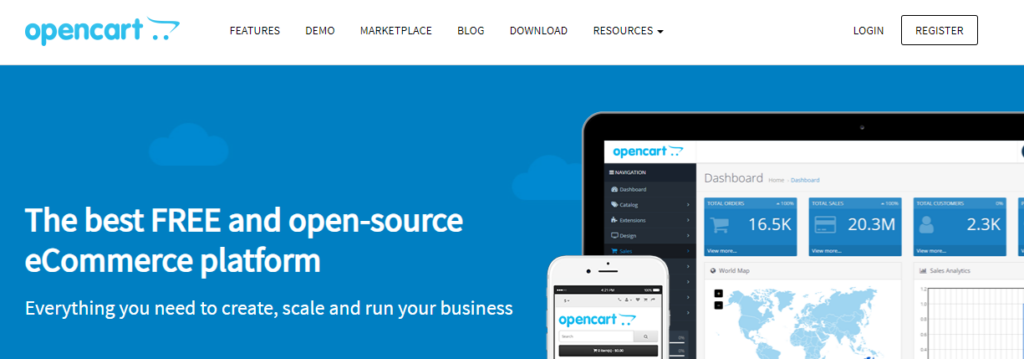
OpenCart is a user-friendly and lightweight open-source shopping cart system that caters to small and medium-sized businesses.
Features
- User-friendly dashboard for easy store management.
- Flexible payment options for customer convenience.
- A diverse set of extensions for enhanced functionality.
- Contributes to faster loading times for improved user experience.
Advantages
- Ideal for small and medium-sized businesses, especially those new to e-commerce.
- Continuous improvement and updates.
- Appeals to users seeking a hassle-free solution.
4. PrestaShop

PrestaShop stands out as an open-source e-commerce solution that prioritizes a user-friendly interface and robust features. Designed for businesses of all sizes, it offers an extensive range of tools to streamline online store management.
Features
- Comprehensive catalog management tools for efficient product handling.
- Multi-store support, enabling centralized control over multiple stores.
- Responsive design to ensure optimal viewing across various devices.
Advantages
- A vibrant community provides continuous support and updates.
- Diverse themes and modules for personalized customization.
- The lightweight architecture ensures swift loading times for enhanced user experience.
5. osCommerce

osCommerce, one of the pioneers in open-source shopping carts, is recognized for its simplicity and ease of use. It continues to be a reliable choice for small to medium-sized businesses seeking straightforward e-commerce solutions.
Get exclusive access to all things tech-savvy, and be the first to receive
the latest updates directly in your inbox.
Features
- Customizable templates and layouts to suit individual brand aesthetics.
- Support for multiple payment gateways, ensuring flexibility for customers.
- Built-in tools for efficient inventory management.
Advantages
- A large and active community offers ongoing support and development.
- Seamless integration with various third-party applications.
- Particularly well-suited for businesses looking for a user-friendly platform.
6. Zen Cart

Zen Cart positions itself as a user-friendly open-source online store management system, emphasizing a straightforward interface and a robust feature set to meet diverse e-commerce needs.
Features
- Comprehensive product management tools for efficient handling of inventory.
- Support for multiple languages and currencies, catering to a global audience.
- Built-in promotion and discount features to drive customer engagement.
Advantages
- Dedicated community support facilitates ongoing development and assistance.
- Easy installation and setup for quick store deployment.
- Flexible and customizable design options for a unique online presence.
7. Shopware

Shopware is an open-source e-commerce platform that focuses on user experience and cutting-edge technology. It offers a seamless and intuitive solution for businesses aiming to create innovative and visually appealing online stores.
Features
- Ensures optimal viewing on various devices for a user-friendly experience.
- Equips businesses with the tools to effectively market their products.
- Provides data-driven insights for informed decision-making.
Advantages
- Access to professional support for enhanced assistance.
- Allows easy customization and adaptability to specific business needs.
- Incorporates modern storefront experiences to engage customers.
12. Sylius
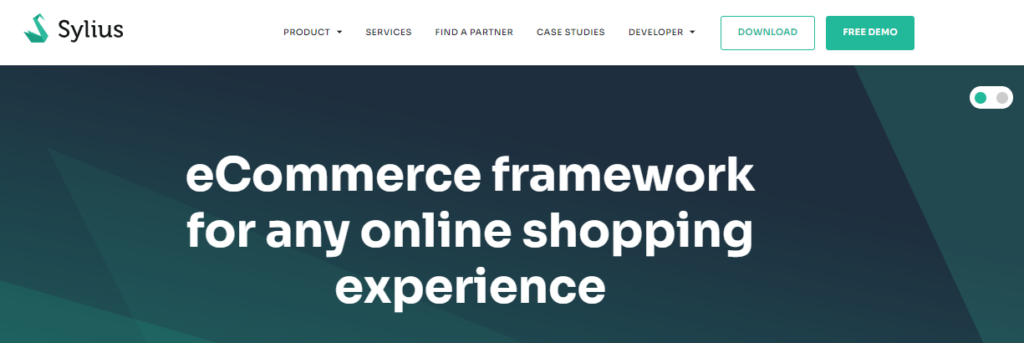
Sylius is a modern, open-source e-commerce platform built on Symfony, offering flexibility and scalability. Its headless architecture and API-driven approach make it a choice for businesses seeking a highly customizable and adaptable solution.
Features
- Allows a decoupled front-end and back-end for flexibility.
- Seamless integration with external services and applications.
- Enhances the user experience with PWA features.
Advantages
- Ensures robust and maintainable code for stable performance.
- Tailor the platform to specific business requirements.
- Active community for ongoing development and updates.
13. Drupal Commerce

Drupal Commerce is an open-source e-commerce solution integrated with the Drupal content management system. It leverages Drupal’s capabilities to provide a content-rich e-commerce experience.
Features
- Utilizes Drupal’s content management features for a robust online presence.
- Offers various options for displaying and showcasing products.
- Simplifies financial aspects of online transactions.
Advantages
- Leverages the strengths of Drupal for content-rich e-commerce sites.
- Access to a vibrant community and comprehensive documentation.
- Scalable and customizable to accommodate diverse business needs.
12. CubeCart
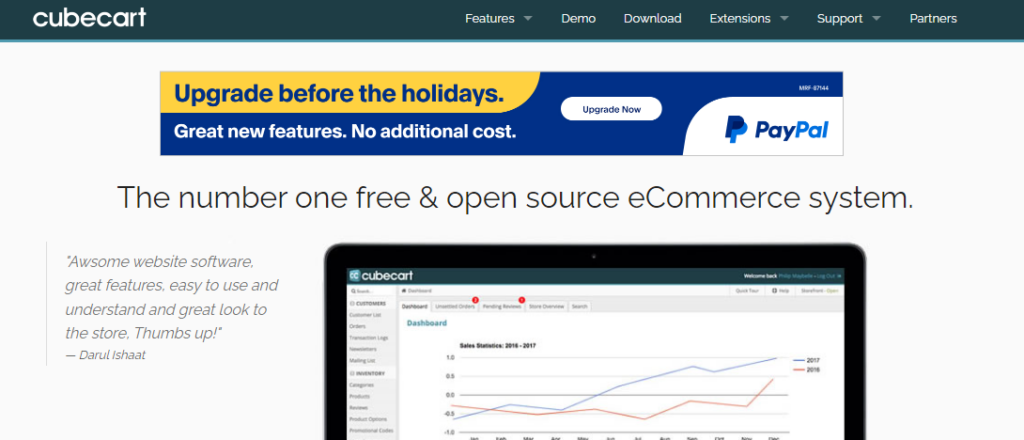
CubeCart is a PHP-based open-source e-commerce platform known for its simplicity and ease of use. Aimed at small to medium-sized businesses, CubeCart provides a straightforward solution for setting up and managing online stores.
Features
- Utilizes the widely used PHP programming language for accessibility.
- User-friendly admin interface for easy store management.
- Supports various payment gateways for flexible transactions.
Advantages
- Ideal for users seeking a hassle-free and quick setup.
- Continuous improvement and support from a dedicated community.
- A cost-effective solution for small and medium-sized businesses.
13. nopCommerce
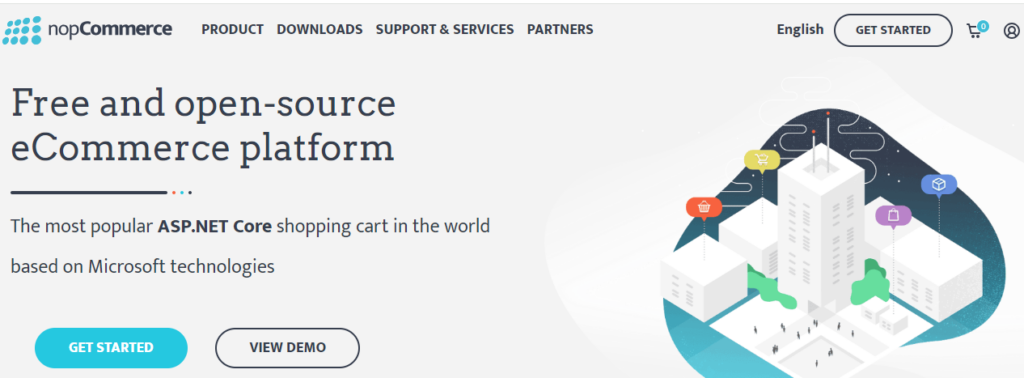
nopCommerce is an open-source e-commerce platform built on the ASP.NET Core framework. Known for its extensibility and scalability, nopCommerce is suitable for businesses of various sizes.
Features
- Utilizes the robust and modern ASP.NET Core framework.
- Allows centralized management of multiple stores.
- Ensures a responsive and mobile-friendly shopping experience.
Advantages
- Benefits from the stability and security of Microsoft technologies.
- Ideal for businesses with evolving and expanding needs.
- Regular updates and support from an engaged community.
14. Thelia

Thelia is an open-source e-commerce platform built with Symfony and PHP. It provides a flexible and modular solution for businesses seeking customization and adaptability.
Features
- Utilizes the Symfony and PHP stack for stability and performance.
- Allows businesses to extend and customize functionality.
- Provides tools for managing multiple languages and currencies.
Advantages
- Benefits from the elegant and powerful Symfony framework.
- Ideal for businesses with specific requirements for their online stores.
- Appeals to businesses targeting a global audience.
15. Spree Commerce
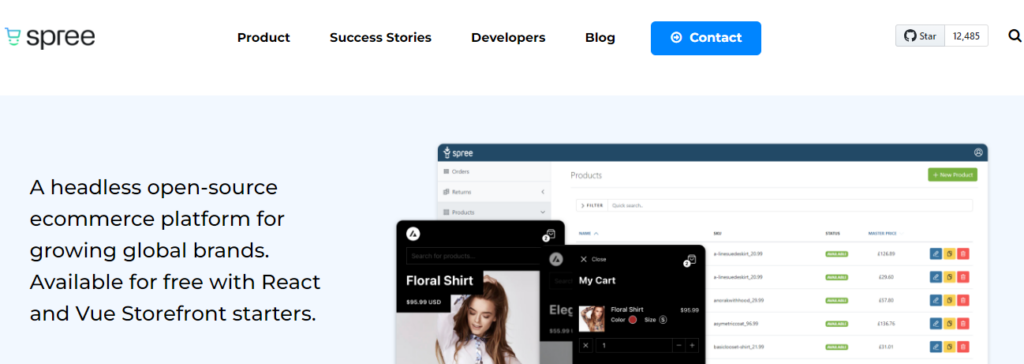
Spree Commerce is an open-source e-commerce platform built with Ruby on Rails, focusing on simplicity and flexibility. It provides a modular and customizable solution for businesses of varying sizes.
Features
- Allows flexibility and customization through a modular approach.
- Ensures an optimal shopping experience on different devices.
- Appeals to a global audience.
Advantages
- Leverages the robust and scalable Ruby on Rails framework.
- Scales effectively to accommodate growing business needs.
- Community support for ongoing development and improvements.
16. Bagisto

Bagisto is an open-source e-commerce platform built on Laravel, designed for simplicity and flexibility. It provides a modern and scalable solution for businesses looking to establish a powerful online presence.
Features
- Utilizes the robust and elegant Laravel framework for stability and performance.
- Allows businesses to manage multiple stores with a single installation.
- Facilitates seamless integration with third-party services and applications.
Advantages
- Leverages the elegance and efficiency of the Laravel framework.
- Ideal for businesses managing multiple stores or brands.
- Enhances user experience with PWA features.
17. Broadleaf Commerce

Broadleaf Commerce is an open-source Java-based e-commerce framework offering flexibility and extensibility. It targets businesses with complex requirements and the need for a highly customizable solution.

Features
- Utilizes the Java programming language for a robust and scalable foundation.
- Offers extensive customization options for unique business needs.
- Supports the management of multiple stores or brands.
Advantages
- Benefits from the stability and security of the Java programming language.
- Ideal for businesses with specific and complex e-commerce requirements.
- Active community for ongoing development and support.
18. Reaction Commerce
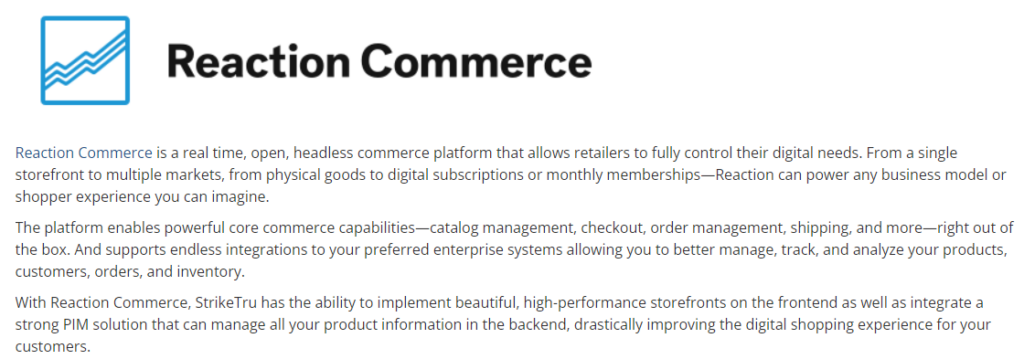
Reaction Commerce is a modern, JavaScript-based e-commerce platform known for its flexibility and real-time capabilities. It provides a headless architecture for seamless integration with various front-end solutions.
Features
- Enables decoupled front-end and back-end for flexibility.
- Provides real-time updates for inventory, orders, and pricing.
- Offers a flexible and efficient API for data retrieval.
Advantages
- Leverages the popular and versatile JavaScript stack.
- Scales effectively to accommodate growing business demands.
- Enhances user experience with real-time information.
19. J2Store
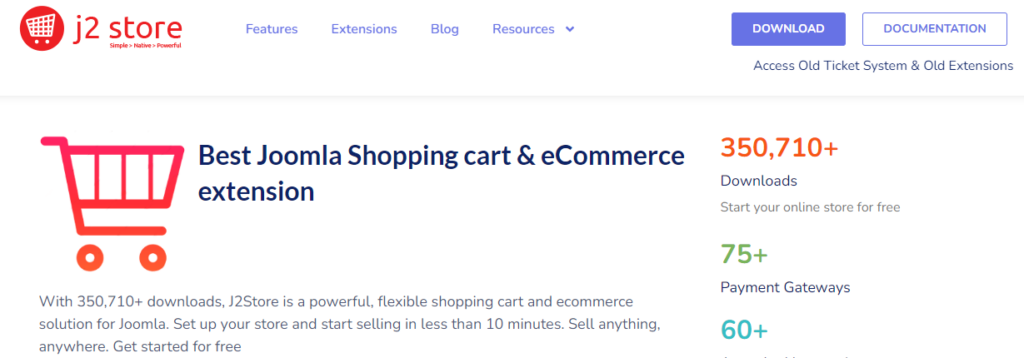
J2Store is a user-friendly, Joomla-based open-source e-commerce solution that seamlessly integrates with Joomla websites. It offers a straightforward approach to online store management for Joomla users.
Features
- Seamlessly integrates with Joomla for a unified web presence.
- User-friendly tools for efficient product catalog management.
- Ensures a consistent shopping experience across devices.
Advantages
- Appeals to users already using or familiar with the Joomla CMS.
- Access to a variety of extensions for enhanced functionality.
- Easy-to-use admin interface for store management.
20. Shuup

Shuup is an open-source e-commerce platform that focuses on flexibility and scalability. Built with Django and Python, it provides a robust foundation for businesses with diverse e-commerce needs.
Features
- Utilizes the Django and Python stack for a powerful and scalable platform.
- Enables the creation of multi-vendor marketplaces with ease.
- Offers extensive customization options for unique requirements.
Advantages
- Benefits from the security features of the Django framework.
- Ideal for businesses seeking a multi-vendor marketplace solution.
- Continuously evolving with active community support.
FAQs
Are these platforms suitable for large enterprises?
Yes, several platforms such as Magento, Shopware, and Thelia are designed to handle the complexity and scalability requirements of large enterprises.
What role does the community play in open-source e-commerce platforms?
The community plays a crucial role in the development, support, and improvement of open-source platforms. Active communities contribute to ongoing updates, security patches, and the creation of extensions.
How do I choose the right open-source e-commerce platform for my business?
Consider factors such as your business size, technical requirements, scalability needs, and the level of customization you seek. Evaluate the platform’s features, community support, and compatibility with your existing systems.
Is there ongoing support available for these open-source platforms?
Yes, most open-source e-commerce platforms have active communities that offer support through forums, documentation, and updates. Some platforms also provide professional support services for businesses that require additional assistance.
Do these platforms support multi-store functionality?
Yes, many of the mentioned platforms, such as Magento, PrestaShop, and nopCommerce, support multi-store functionality, allowing businesses to manage multiple stores from a centralized platform.
Final Words for Open-Source Shopping
In the dynamic landscape of e-commerce, the availability of open-source shopping platforms has empowered businesses of all sizes to establish and expand their online presence. The top 20 open-source shopping websites presented in this comprehensive overview offer a diverse range of features, from user-friendly interfaces to robust customization options.
Whether leveraging PHP, Ruby on Rails, Java, or other technologies, these platforms cater to various business needs, providing scalability, flexibility, and a community-driven ethos. Each solution brings unique strengths to the table, ensuring that businesses can find the right fit for their requirements. As the e-commerce industry continues to evolve, the collaborative spirit of open source remains a driving force, promising continued innovation and adaptability in the years to come.



